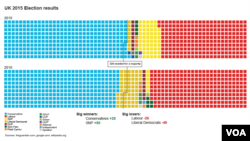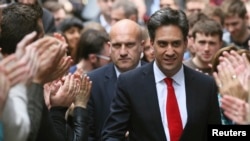Britain's Prime Minister David Cameron has vowed to govern as the party of "one nation" and to make his country "greater," one day after his Conservative Party secured a majority in Britain's parliamentary vote.
Speaking on Friday outside 10 Downing Street after visiting Buckingham Palace, Cameron said he will form a Conservative majority government. He said Britain is "on the brink of something special" and can become a place where a good life "is in reach for everyone who is willing to work and do the right thing."
He described Britain as a country with "unrivalled skills and creativeness."
“To me, this election campaign was always about the difficult decisions we had to take over the last five years, the foundation of the stronger economy that we built for our country and the chance now to build on that foundation,” Cameron said.
On Friday, President Barack Obama called Cameron to congratulate him on the victory. The White House said Obama reiterated his strong commitment to the U.S.-British relationship and told Cameron he looks forward to continue to address a range of share interests and the challenges the two nations face around the world.
Cameron defied pre-election polls that predicted a slim outcome in Thursday's election. He will get another five-year term as prime minister and his Conservative party will take more than 326 of the 650 seats up for grabs in the House of Commons.
Also Friday, Cameron pledged to allow a referendum on whether Britain should stay in the 28-nation European Union trade bloc. Such a choice could go before British voters within two years, media analysts speculated.
Big gains by the Scottish National Party were one of the biggest surprises in the election. The pro-independence party won more than 50 seats, soundly defeating Labor and making Scotland a near one-party state.
Labor also failed to make headway against the Conservatives in England and Wales.
Party leaders resign
The results prompted the resignations of opposition party leaders, including Ed Miliband of the second-ranking Labor Party and Nigel Farage of the anti-immigrant UKIP party. Nick Clegg, the head of Britain's Liberal Democrats who served as deputy prime minister for five years, also stepped down as party leader.
“Now it’s time for someone else to take forward the leadership of this party, so I’m tendering my resignation,” Miliband said. “I want to do so straight away because the party has to have an open and honest debate about the right way forward.”
It was a sharp disappointment for Miliband, who just the day before had reason to believe he might become prime minister and reverse much of the Conservatives’ austerity policy.
Economy, Scotland cited as factors in win
Professor Peter Urwin of the University of Westminister said with the economy still under threat, in the end voters went with the party that has brought the improvement of the last few years.
“I think the phrase [is] ‘safe pair of hands.’ The last five years the Conservatives have been seen to guide the economy through some pretty rough waters,” he said.
Urwin said the spending cuts that were a key part of the Conservatives’ policy mainly hit types of people who don’t vote for them anyway, including welfare recipients and young people.
Former journalist now senior fellow at the Chatham House research center, Quentin Peel, focused on a different factor. He said concern that Labor would have needed support from the Scottish National Party to form a government drove many voters to the Conservatives in the final days of the campaign.
“It was a late surge to safety by English voters voting for the devil they knew, even if they weren’t enthusiastic about it,” Peel said.
The liberal and pro-independence Scottish National Party, which won at least 56 of the 59 seats available from Scotland, had hoped to be part of an anti-Conservative coalition. Now, its sharply increased delegation in parliament will sit in opposition, and its plan for another referendum on Scottish independence is likely put off to the indefinite future.
Scottish voters rejected independence in a referendum just last year.
The right-wing anti-immigration, anti-European Union UK Independence Party captured an unprecedented 12 percent of the national vote. But the support was spread across the country and the party took only one seat in parliament.
Its flamboyant leader Nigel Farrage lost his bid for a seat and resigned as party leader, although he said he might run for the post again in September.
EU referendum promised
Prime Minister Cameron is committed to holding a referendum on Britain’s membership in the EU by 2017.
"Yes, we will deliver that in-out referendum on our future in Europe," Cameron said Friday before his meeting with the Queen.
Before that vote, he wants to negotiate changes in the relationship that will convince British voters to stay in the Union. But he faces hard bargaining with leaders on the continent.
Peel said although Britain is a permanent member of the U.N. Security Council and a member of the G7, it will be focused largely on domestic issues in the coming years.
“Britain, for the foreseeable future, is going to be totally wrapped up in itself, very unengaged in the wider world,” he said. “They don’t want to get into any more foreign adventures.”
For now, Cameron will focus on selecting ministers for an all-Conservative government he is expected to present to parliament next week, with its approval assured.






